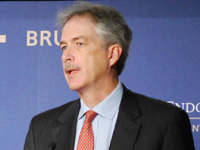Registration
You will receive an email confirming your registration.
On the eve of Indian Prime Minister Manmohan Singh’s trip to the United States, the bilateral relationship is undergoing an important transformation. India’s economic dynamism, its growing role in the international system, and its breakthrough civil nuclear agreement with the United States have laid the groundwork for significant advancements in U.S.–Indian engagement. It is against this backdrop that Singh was invited to be the first state visitor of the Obama administration. This decision not only reflects optimism about the future of bilateral ties, but also the hope that India will become an increasingly vital partner in realizing Obama’s vision of “spheres of cooperation” across the Asia-Pacific region.
Under Secretary of State for Political Affairs and former Ambassador William J. Burns discussed the Obama administration’s approach to U.S.-India relations. Following Ambassador Burns' remarks, Ashley J. Tellis outlined his two recent policy briefs on the direction of the U.S.–India relationship and moderated a panel on the topic. Experts included Teresita Schaffer of the Center for Strategic and International Studies, C. Raja Mohan, the Kissinger Scholar in Foreign Policy and International Relations at the Library of Congress, and Evan Feigenbaum of the Council on Foreign Relations.
Deepening strategic engagement
The U.S.-India relationship has undergone steady improvement since the end of the Cold War and bilateral dialogue on a wide variety of issues has proliferated in recent years. Experts on the panel pointed out that despite the breadth and diversity of Indo-U.S. interaction, both countries would stand to benefit from a deeper strategic engagement.
- Ambassador Burns outlined the Obama administration’s New Strategic Dialogue. While the United States will continue to engage India on such basic issues as education, scientific exchange, and human development, it will emphasize global security challenges. Specifically, greater U.S.-India cooperation can be expected on counterterrorism, reconstruction in Afghanistan, nonproliferation, and defense.
- Tellis and Schaffer stressed the need to focus the bilateral dialogue on high politics and deeper, more substantive concerns. They warned against allowing issues of low politics—what Tellis called the “dominance of ordinariness”—to overshadow discussion on core strategic interests.
India in a regional context
As India and China continue their impressive ascent toward great power status, they are reshaping both regional and global power architectures. These changing realities also demand a fundamental reassessment of U.S. policy approaches towards the greater Asia region.
- Schaffer pointed out that while India and China have many overlapping security interests, including border disputes and maritime claims, the United States continues to put the two emerging powers in separate categories. Feigenbaum also suggested that American policy makers re-conceptualize their thinking on Asia to include India as a key player in the entire region, rather than just as a South Asian power.
- Feigenbaum brought up the issue of relations between India and Pakistan, arguing that the United States should continue to de-hyphenate the two countries in its strategic thinking.
Uncertainties in the U.S.–India relationship
Despite optimism about the upward trajectory of U.S.–India relations, some challenges remain, stemming mostly from uncertainty about the Obama administration’s commitment to India.
- Mohan pointed out a major source of concern for India was that the United States might meddle in India-Pakistan relations and disrupt the back-channel negotiations on Kashmir that, without U.S. interference, have proven most effective.
- Schaffer also explained that India is worried that the new U.S. administration may become distracted and focused elsewhere. Mohan reinforced this observation by cautioning the United States against viewing its relationship with India through the prism of China, instead of on its own merits and interests.
Looking ahead: Bilateral pragmatism and a new era
The experts agreed that Singh’s visit is likely to start a new era of greater cooperation between the United States and India.
- Tellis predicted that the United States will use the occasion of Singh’s visit to reaffirm American commitment to transforming the relationship, to provide reassurance that U.S. and Indian goals are aligned, and to build on complementaries that exist between the two countries.
- Mohan stressed that the Obama administration should not become too preoccupied with a treaty-based approach to addressing issues involving India, such as climate change and nonproliferation. Instead, it should step away from its ideological affinity for multilateralism and focus instead on taking pragmatic steps such as signing bilateral agreements that will produce concrete outcomes.
- Feigenbaum explained that the scope and pace of deepening U.S.–India relations will largely be determined by India’s choices. The current Indian administration’s top priorities are focused on domestic policy, so it will take conscious political will to achieve progress on foreign policy and in the bilateral relationship with the United States.
